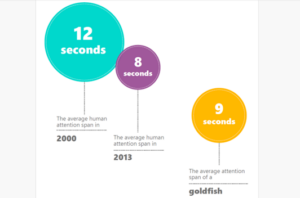We’ve heard it at lectures, and perhaps echoed the claim ourselves – the attention span of a goldfish is 9 seconds, and that of humans is less. As detailed in TIME Magazine,
[r]esearchers in Canada surveyed 2,000 participants and studied the brain activity of 112 others using electroencephalograms (EEGs). Microsoft found that since the year 2000 (or about when the mobile revolution began) the average attention span dropped from 12 seconds to eight seconds.
“You Now Have A Shorter Attention Span Than A Goldfish,” TIME Magazine (May 14, 2015) https://time.com/3858309/attention-spans-goldfish/ (last visited December 5, 2023).
The Microsoft Report didn’t just say this – it showed it

And this is a claim that has made its way into legal scholarship. A LEXIS search found more than a dozen law review or similar articles accepting this as a valid proposition.
If that 8 second span is the case, the dynamics of persuasion – trial, appellate or otherwise – need radical adjusting.
But is it accurate? I became interested in this when drafting an overview of opening statements for a Collective Wisdom piece to be published by NITA and decided I needed to learn about attention span. After all, in the advocacy arena we also have seen people embrace the “30 second” rule of commercial advertising – you have 30 seconds to get the message out, so the first 30 seconds of an opening statement had better be captivating. Milo Frank, HOW TO GET YOUR POINT ACROSS IN 30 SECONDS OR LESS (1987)(claimIng that attention span extends only to the half-minute mark); “The 30 Second Rule: Why Grabbing Their Attention In The First 30 Seconds Is Crucial” (2017), https://www.presentationtraininginstitute.com/30-second-rule-grabbing-attention-first-30-seconds-crucial/ (last visited December 6, 2023). That brought me back to the world of fish and memory.
The first problem is the goldfish claim. The “8 second” reference is found only in the visual shown above and sourced to STATISTICS BRAIN. If one tracks the ‘research’ back to its source, there is arguably no ‘there there.’
This was detailed in a 2017 Wall Street Journal article:
The features of human attention are too complex to reduce to a span of time, and the metrics scientists do track haven’t changed in generations.
“I’ve been measuring college students for the past 20 years,” said Edward Vogel, a professor of psychology and neuroscience at the University of Chicago. “It’s been remarkably stable across decades.”
His findings echo those of other experts, including Michael Posner, a psychologist known for identifying the brain networks underlying attention, and Marcus Raichle, a neurologist and authority on brain metabolism. They say the ability of healthy adults to pay attention hasn’t diminished.
“There is no real evidence that it’s changed since it was first reported in the late 1800s,” Dr. Posner said. Yet it has been widely reported that our focus has slipped.
McGinty, “Is Your Attention Span Shorter Than A Goldfish’s?”, Wall Street Journal February 17, 2017.
Further reporting continues to debunk the 8-9 second claims. As explained in a Forbes article, the STATISTICS BRAIN claim was based on only two sources, one of which was “an analytics report about 25 people who quickly left websites they didn’t like… in 2008.” Science Shows: Humans Have Massive Capacity For Sustained Attention, And Storytelling Unlocks It,” Forbes, January 16, 2023. That same article claims that NETFLIX data show a great attention span – binge watching.
The next problem with the goldfish claim is that is begs the question of what “attention” means. In the Microsoft research, that word is defined as “The allocation of mental resources to visual or conceptual objects.” It is not clear to me whether or how this applies to the task of being a juror, as at least part of the Microsoft study focuses on attention in an arena with “distracting or competing stimuli.” REPORT, 26. Indeed, there are multiple forms of attention – there can be selective attention, alternating attention, and sustained attention.
Additionally, other researchers with data have different results. Consider the work of Gloria Mark, Chancellor’s Professor of Informatics at the University of California, Irvine and the author of ATTENTION SPAN: A GROUNDBREAKING WAY TO RESTORE BALANCE, HAPPINESS AND PRODUCTIVITY (2023). In an essay adapted from that book she wrote
To study people’s attention on their devices, with my research team at the University of California, Irvine, and with colleagues at Microsoft Research, I observed people in their natural environments and created living laboratories. We used sophisticated computer logging techniques to measure attention spans and heart rate monitors and wearable devices to measure stress. Back in 2004, we found that people averaged 150 seconds on any screen before switching to another screen. By 2012, it had declined to 75 seconds, and between 2016 and 2021, it diminished to 47 seconds. Studies by others have replicated these results within three seconds.
Gloria Mark, How to Restore Our Attention Spans — Digital distractions are ramping up our natural tendency to shift focus, raising stress levels and hurting productivity. But we can still take control. Wall Street Journal, January 7, 2023 (https://www.proquest.com/docview/2761477287?accountid=14270&pq-origsite=primo&parentSessionId=IA8iLQve2NnMCbRlSZGFuMOT%2B8DF5i%2F4p3nV4Zr9Ji4%3D, last visited December 5, 2023).
Clearly, in a courtroom one can’t “switch screens.” And attention spans in the courtroom? Perhaps there is no precise study, but consider this validation of what we all teach – story-telling – from the same Forbes article cited above:
For the last 20 years, scientists like Dr. Paul Zak have been studying the experiences that induce this immersive state. In general scientists have observed that when more of our brains are active in particular ways, we pay attention and encode more into memory. And good stories tend to check all the boxes.
I will have more to say about Zak’s research, described in the book IMMERSION, in another BRAIN LESSONS column. For now, don’t succumb to the 8-second, we-are-lesser-beings-than-goldfish myth. And by the way – there is no science for the goldfish-at-9-seconds claim either. Apparently fish can pay attention much longer than 8 or 9 seconds too. Even without a compelling story.
